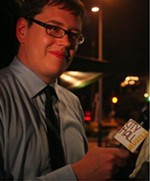Long Stories Short
The Cinematexas INternational Short Film Festival
By Wells Dunbar, Fri., Sept. 12, 2003

Science Is Fiction: The Films of Jean Painlevé
Jean Painlevé managed over the course of some 200-plus short films to synthesize science with the surreal, sterility with subjectivity, to create a uniquely idiosyncratic view of the wild kingdom. By endowing his often nautical subjects with human complexity, emotion, and desire, Painlevé won the acclaim of contemporaries such as Brunel and Godard, influencing not only the surrealists and the New Wave, but even movements as diverse as Dogme 95.
As part of Cinematexas' Special Screenings, six of Painlevé's works will be shown, beginning with "L'Hippocampe" (1934), Painlevé's most popular work. Adhering neither to the strict tenets of the scientific documentary nor those of narrative feature, Painlevé chronicles sea-horse coupling, culminating with the male giving birth. Jarring jump cuts of the male flailing about in labor may have won over the surrealists (as the dissection of the male's engorged, egg-filled abdomen rivals Un Chien Andalou's infamous eyeball slice), but it's the endearing human quality Painlevé endows these creatures with that's unique. A sympathetic narrator creates a human empathy for this curious creature, in turn humanizing the horse.
Painlevé tackled our more insidious impulses with "The Vampire," a documentary about the vampire bat. Filmed in 1945, it's been oft noted that the diseased blood-sucking beast is Painlevé's metaphor for Nazism. While this is true (replete with a wing stretch resembling a sieg heil), on a more base level it is a treatise on the banality of cruelty. Painlevé's choice of a Duke Ellington swing soundtrack drives the insipidness of the violence home; after draining a guinea pig, our narrator explains, the vampire enjoys a quick stretch and a nap.
"Liquid Crystals," the most transformative of all Painlevé's films, is also the most hypnotic. After a brief introduction, which explains the following images to be crystalizable liquids as viewed through a microscope, Painlevé abandons narration in place of foreboding yet enthralling music. For the next six minutes we're treated to a cathartic kaleidoscopic extravaganza of ever-shifting color and light, six minutes that pass far too soon.
Science Is Fiction: The Films of Jean Painlevé screens Thursday, Sept. 18, 9:15pm, at the Alamo Drafthouse Downtown.








